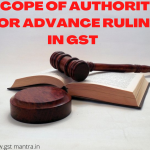Anomalies in GST Law
Input Credit on Capital Goods( in-transit) on Appointed Date.
As per Sub-Section 5 of Section 140 of CGST Act, 2017 a registered person shall be entitled to take credit of eligible duties and taxes in respect of inputs or input services received on or after the appointed day but the duty or tax in respect of which has been paid by the supplier under the existing law. However, parallel provisions covering capital goods in transit are missing. There cannot be any rational for not allowing credit of CENVAT / VAT paid on Capital Goods, if in Transit on appointed date. Does the govt. wants to get the clearance / import of such capital goods stopped during Transitional period.
Input Credit on Capital Goods available with Registered Person On Appointed date.
As per Sub-Section 3 and 4 of Section 140 of the CGST Act, 2017 who was engaged in the manufacture of exempted goods or provision of exempted servicesshall be entitled to take credit of eligible duties in respect of inputs held in stock and inputs contained in semi-finished or finished goods held in stock on the appointed day.
However, again parallel provisions for capital goods are missing. There may be a rational for not allowing input tax credit in respect of capital goods already lying in stock. As it can be presumed that the registered person may have capitalized the duty portion and have availed depreciation under Income Tax Law. The moot point which has lost sight that the GST Law is coming into operation from the middle of a financial year and also the accounts for the year 2016-17 have not yet been finalized. Therefore, suitable provisions should have been made to enable the registered persons to avail such credit with a condition that they will not claim depreciation on such duty portion.
Benefit Arbitrarily Denied to Some Manufacturers / Service Providers.
The benefit of availing Credit of Duty paid on Raw Materials, Under Section 140 (3) and (4), is limited only to those manufacturers who were engaged in providing exempted services / manufacturing. Please take note that the said benefit is not extended to entire notification no. 26/2012, but restricted only to works contract, availing benefit of said notification. Exempted Goods and Exempted Services are defined in CENVAT Credit Rules, 2004 and nowhere else. As per definitions contained in CENVAT Rules, exempted goods and services also includes those goods and services, in respect of which Credit of taxes paid on input and input services is not availed. However,there are various other exemptions, wherein only credit of specified inputs was denied. For example, under Notification No. 26/2012-ST Hotels and Restaurants were not eligible for CENVAT credit in respect of goods falling under Chapter 1 to 22 and Tour Operators were not eligible to avail credit on Inputs and Capital Goods (Service Tax Credit was allowed. Similarly, under Notification No. 12/2012 – C. E., body builders were not eligible for availing credit on Chassis. As these manufactures / service providers were availing credit in respect of certain inputs or input services and thus not covered under ‘exempted goods’ and exempted services. Consequently, also not eligible to avail credit of duty paid on goods, lying in their stock on appointed date, in respect of which they were not eligible to avail credit. Whereas in GST, tax will be levied on value, including value of such inputs.
Return of Capital Goods lying with Job worker on Appointed Date.
As per Section 141 of The CGST Act, the principle manufacturer can receive back inputs/ semi-finished goods or finished goods lying with the job-worker on appointed date, without payment of GST. Surprisingly,similar provisions for capital goods lying with job workers are again missing. Certainly, there is no rational on charging GST on Capital Goods lying with Job-workers etc.
JOB WORK
If Job-worker situated in same State / UT, wherein Raw Material supplier is situated.
As per Section Section 143 of the CGST Act, 2017, A registered person may send any inputs or capital goods, without payment of tax, to a job worker for job work and have to bring back the same, within the prescribed period. As per Section 16 of the Act, such inputs and capital goods can be directly sent to the job-worker and Principle will be entitled to avail credit on receipt of such goods by job-worker. But, Section 10 (1)(a) and 10(1)(b) of the IGST Act 2017 have created an anomalous position.
Section 10 (1) of IGST Act.
- (1) The place of supply of goods, other than supply of goods imported into, orexported from India, shall be as under,—
(a) where the supply involves movement of goods, whether by the supplier or the recipient or by any other person, the place of supply of such goods shall be the location of the goods at the time at which the movement of goods terminates for delivery to the recipient;
(b) where the goods are delivered by the supplier to a recipient or any other person on the direction of a third person, whether acting as an agent or otherwise, before or during movement of goods, either by way of transfer of documents of title to the goods or otherwise, it shall be deemed that the said third person has received the goods and the place of supply of such goods shall be the principal place of business of such person;”
As per the above Section 10 (1)(a) the place of supply will be the destination of goods. Suppose a principle manufacturer and supplier of goods are located in two different States but job worker is located in that very State wherein the supplier is situated. The goods are sent directly to such job worker. As per the above stated Section 10 (1) such a supply would be intra-State supply and CGST + SGST will be charged. But, the principle manufacturer being located in a different State would not be eligible to avail input tax credit in respect of the said taxes.
Even the provisions contained in Section 10(1)(b) is also of no help due to its poor drafting. As per the said legal provision, if the goods are delivered to ‘recipient’ or ‘’any other person’ on the direction of ‘third person’, the place of supply would be the location of such ‘third person’. The tern ‘recipient’ is not defined in IGST Act, therefore, the definition of the said term contained in Section 2 (93) of the CGST Act, would be applicable. As per CGST Act, the recipient is the person who is liable to pay for consideration. If the recipient is liable to pay consideration then he alone is entitled to receive the supply. No third person have any locus standi to issue any such direction. Apparently, while drafting the said legal provision the definition of ‘recipient’ have been missed. Thus, the said clause, in present form, is also not applicable to the given situation.
Contradictory Provisions Contained in Section 10 and Section 33 of the CGST Act.
As per Section 10 of CGST Act, a person operating under Composition Scheme cannot indicate GST amount in Bill of Supply issued. On the other hand, Section 33 mandates that duty amount forming part of price charged has to be prominently indicated on the Tax Invoice or like document issued. It can be nobodies case that the duty amount payable by a person operating under Composition Scheme will not form the part of price Charged by him. Thus, both the said sections contain diagonally apposite provisions. Interestingly, both Section 10 and 12 starts with the phrase, “Notwithstanding anything contained in this act” and thus have overriding effect on other provisions contained in said legislation. Now, the question is as to how a registered person comply with statutory obligations contained in the two Sections. The maxim “generialiaspecialis-bus non derogant” is well known for the reason that where there is Special Act, it will override the general Act or the general provision should yield to special provision. The Hon’ble High Court of Orissa applied the said maxim in Gaurmani Devi Vs. Shree JagannathMahaprabhu, W.P.(C) No. 3113 of 2015. Certainly, in Section 10 and Section 33, Section 10 is a special provision dealing with a particular class of registered persons, whereas Section 33 is general as applicable to all the taxable persons. Therefore, applying the said legal maxim, provisions contained in Section 33 will give way to Section 10. However, the moot question is whether such a situation is welcome one, particularly considering that Section 10 is specifically incorporated to give relief to very small taxpayers.
It is hoped that the CBEC and Law Ministry will again go through these legislations and suggest suitable amendments to save Trade as well as govt. from avoidable litigation.




Leave A Comment